Are you looking for external SSDs for PC, PS5, Xbox, and gaming laptops? Learn how to buy the best external SSD for gaming in 2025 quickly!
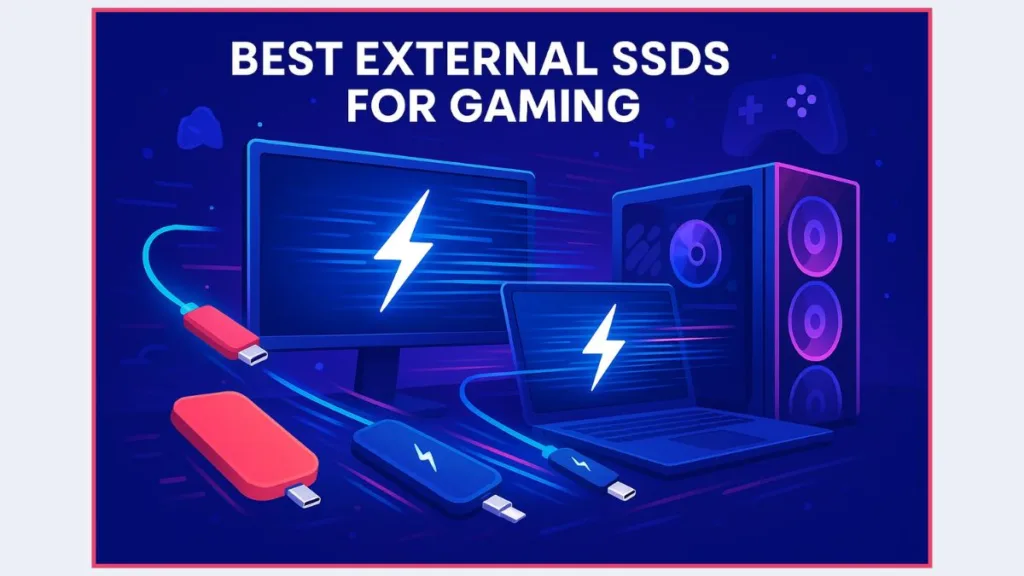
Gamers today need fast, reliable storage that keeps up with ever-growing game libraries. An external SSD for gaming is the perfect solution—boosting load times, expanding storage capacity, and giving you the freedom to play anywhere.
In this guide, we’ll show you how to buy the best external SSD for gaming in 2025 and what to look for to get the most performance and value.
Why Gamers Are Searching for the Ultimate External SSD
Gaming today isn’t what it used to be. Modern titles are more expansive, visually stunning, and downright massive in size. It’s no surprise that gamers everywhere are hunting for the best external SSD for gaming—a solution that promises faster load times, more storage space, and the flexibility to play wherever they want.
Games Are Getting Bigger—and Storage Is Struggling
Let’s face it: AAA games these days aren’t shy about gobbling up storage. Popular titles can easily exceed 100GB, and if you’re running multiple games, that number multiplies quickly. Most PCs, laptops, and even consoles have limited internal storage, making it a constant struggle to manage your game library. External SSDs act like a safety net—they give you that extra breathing room without forcing you to uninstall beloved games.
Lightning-Fast Load Times for an Edge in Gaming
Storage speed matters, and this is where external SSDs shine. Unlike traditional hard drives (HDDs), SSDs offer rapid read/write speeds that dramatically cut down loading screens. Imagine jumping straight into the action instead of staring at a loading wheel for minutes. Whether you’re playing on a gaming laptop, PC, or console like a PS5, an external SSD for gaming can make your experience smoother, more immersive, and less frustrating.
Portability: Your Games, Anywhere You Go
One of the biggest perks of an external SSD is its portability. With a compact, plug-and-play drive, you can carry your full game library in your backpack. Heading to a friend’s house, attending a LAN party, or switching between a desktop and a laptop? Your games travel with you—without complicated installations or repeated downloads.
Effortless Upgrades—No Tech Expertise Needed
Upgrading internal storage can feel intimidating. Opening up a gaming console or PC is tricky, and one wrong move can cause headaches. External SSDs simplify this process, offering a straightforward, no-fuss way to expand your storage. Plug it in, transfer your games, and you’re ready to play—no screws, no manuals, no stress.
Why Gamers Prioritize SSDs Over HDDs
While external HDDs can store a lot of data, they simply can’t match SSDs in speed, durability, and convenience. An external SSD isn’t just extra storage—it’s a performance upgrade. Faster game loads, smoother gameplay, and portability make SSDs a must-have for serious gamers.
In short: Gamers are searching for the ultimate external SSD because it’s not just about more space—it’s about smarter, faster, and more flexible gaming. From reducing load times to carrying your library on the go, an external SSD for gaming addresses the challenges modern players face every day.
Understanding External SSDs for Gaming Performance
When it comes to gaming, storage isn’t just a background component—it’s a critical part of performance. External SSDs have evolved far beyond simple portable storage devices; they are now performance boosters that directly impact load times, asset streaming, and overall gaming responsiveness. Understanding how they work, their features, and what makes a drive suitable for PC or console gaming can help you make an informed choice and get the best value for your investment.
What Makes an External SSD Different?
Unlike traditional Hard Disk Drives (HDDs), which rely on mechanical spinning disks and moving read/write heads, Solid-State Drives (SSDs) store data on non-volatile flash memory chips. This difference isn’t just technical—it’s a game-changer for players. External SSDs for gaming provide:
- Instant data access: Files and game assets are retrieved almost instantly, removing long loading screens.
- Rapid read/write speeds: Ideal for installing massive AAA titles without waiting hours.
- Enhanced durability: Without moving parts, SSDs are shock-resistant and better suited for portable gaming setups, unlike fragile HDDs.
- Compact portability: Most external SSDs are pocket-sized, making it simple to carry your entire game library wherever you go—whether to a friend’s house, LAN parties, or between PC and console setups.
For gamers, these advantages translate to smoother gameplay, reduced lag, and the freedom to play anywhere without worrying about damaging the drive.
How SSD Speed Affects Gaming
One of the most important aspects of an external SSD for gaming is its speed, and not all SSDs are created equal. Faster drives reduce frustrating loading times, allow instantaneous access to game assets, and can even impact in-game performance in titles that heavily rely on asset streaming or open-world environments.
- Sequential Read/Write: This measures how quickly large files, such as game installations or patches, are transferred. Higher sequential speeds mean faster game setups and less waiting.
- Random Read/Write (RND4K): This affects how quickly smaller, fragmented data chunks are accessed during gameplay, impacting texture streaming, NPC animations, and world rendering.
In short, a high-quality external SSD ensures your games run smoothly, from launch to endgame, giving you an immersive experience without interruptions.
Choosing the Right Interface: USB-C vs Thunderbolt
The connection type plays a crucial role in unlocking the full potential of your external SSD for gaming. Most modern drives use USB-C, while Thunderbolt 3/4 options deliver ultra-fast transfer speeds.
- USB 3.2 Gen 2×1 (10 Gbps): Perfect for most gamers, providing solid read/write performance for PCs, gaming laptops, or consoles like the PS4 and Xbox Series X.
- USB 3.2 Gen 2×2 / Thunderbolt 3/4 (20–40 Gbps): For enthusiasts with high-end PCs, these interfaces offer lightning-fast file transfers, reduced load times, and the ability to store and run massive game libraries seamlessly.
Pro tip: To truly leverage a drive’s speed, ensure both the port and cable match or exceed the SSD’s maximum rated speed. Using an older port or cable can bottleneck performance, wasting the potential of a high-end drive.
SSD Capacity: How Much Do You Really Need?
With modern AAA games sometimes exceeding 100GB per title, storage capacity is a key consideration. Here’s a practical guide for gamers:
- 500GB–1TB: Ideal for casual gamers or smaller libraries. Enough for 5–10 large titles.
- 2TB–4TB: Suited for enthusiasts, PC gamers, and console players who want seamless storage for multiple large games, including mods and DLCs.
- 8TB+: Best for those looking to store massive libraries, media collections, or use as backup drives for PCs, Steam Decks, or game consoles.
Remember, higher capacity usually comes at a premium, but it’s an investment that pays off with long-term convenience, less file juggling, and peace of mind.
Durability Matters for Gamers on the Move
Unlike internal SSDs, external drives travel with you. A durable external SSD can survive accidental drops, spills, and dusty environments, which is especially important for portable gaming setups. Look for features like:
- Shock Resistance: Protects your drive from drops or bumps during travel.
- Water/Dust Resistance (IP Ratings): Safeguards against accidental splashes or LAN party mishaps.
- Rugged Build: Rubberized or reinforced casings ensure your drive maintains performance consistency despite rough handling.
A durable SSD doesn’t just protect your games and save files; it also ensures that you can trust it for long-term portability, whether you’re gaming at home or on the go.
Understanding the technology behind external SSDs, their speed, capacity, and durability, is crucial for gamers who demand the best performance. Choosing the right external SSD for gaming isn’t just about storage—it’s about enhancing your gameplay, reducing load times, and making your gaming setup flexible and future-proof. Investing in a reliable, high-performance drive ensures that your PC, console, or gaming laptop keeps pace with the rapidly growing size and complexity of modern games.
Key Advantages of Using an External Gaming SSD
For gamers, an external SSD for gaming is more than just an extra storage device—it’s a game-changer. Whether you’re using a gaming laptop, PC, or console like the PS5, Xbox Series X, or Steam Deck, the right external SSD can significantly improve your gaming experience. Let’s break down the key advantages that make these drives a must-have for modern gamers.
1. Lightning-Fast Load Times
One of the most immediate and noticeable benefits of a best external SSD for gaming is dramatically reduced load times. Unlike HDDs, which rely on spinning disks, SSDs use flash memory for instant access to data.
- Game Launch Speed: Expect your favorite AAA games to launch almost instantly, eliminating the long waits that can kill the immersion.
- Level and Asset Loading: In open-world games or titles with heavy assets, SSD speeds keep textures, maps, and characters loading smoothly, reducing stuttering and frame drops.
- Multiplayer Matches: Quick load times mean less downtime waiting in lobbies or during map transitions, keeping you in the action.
A fast external SSD is particularly useful for gamers juggling multiple titles, ensuring that swapping between games doesn’t feel like a chore.
2. Expanded Storage Without Sacrificing Performance
Modern games are huge, often exceeding 100GB per title, and internal storage on consoles or laptops can quickly fill up. An external SSD for gaming laptop or PC provides a practical solution:
- Portable Game Library: Carry dozens of games with you without worrying about running out of space.
- Multiple Device Compatibility: Plug your SSD into a PC, console, or even a Steam Deck to access your game library wherever you play.
- Easy Upgrades: Avoid the complexity of opening your gaming system to install a larger internal drive. An external SSD makes expanding storage effortless and stress-free.
Whether you’re looking for an external SSD for gaming 2TB or a 4TB powerhouse, these drives let you store and run games without juggling files or sacrificing performance.
3. Enhanced Durability and Reliability
Gamers on the move need storage that can withstand everyday accidents. Unlike HDDs, external SSDs have no moving parts, making them inherently more durable.
- Shock and Drop Resistance: Protects against accidental drops during travel or LAN parties.
- Water and Dust Resistance (IP Ratings): Many premium SSDs like the Samsung T7 Shield offer IP65 protection, keeping your data safe from spills or dusty environments.
- Consistent Performance: External SSDs maintain steady read/write speeds, even during large file transfers, so you can trust that your games will run reliably every time.
Durability isn’t just about survival—it’s about ensuring your investment lasts while keeping your gaming sessions uninterrupted.
4. Portability and Convenience
A major draw of external SSDs is their compact size and plug-and-play functionality. Gamers can enjoy flexibility in ways internal drives can’t match.
- Easy to Carry: Small, lightweight drives fit into a backpack, perfect for gaming at friends’ houses or on-the-go setups.
- No Installation Hassles: Simply plug it into a compatible USB-C or Thunderbolt port, and you’re ready to play.
- Cross-Platform Use: Many external SSDs work seamlessly with PCs, laptops, consoles, and even the Steam Deck, making them versatile tools for any gamer.
Portability ensures that your entire gaming library travels with you, and you don’t have to compromise on speed or storage capacity.
5. Improved Gaming Performance on Multiple Devices
Using an external SSD doesn’t just expand storage—it can enhance performance across platforms.
- Faster Game Loads on Consoles: Whether it’s the PS5, Xbox Series X, or PC, games installed on SSDs load faster than those on internal HDDs.
- Smooth Gameplay: High-speed external SSDs reduce stutter and texture pop-ins, especially in resource-heavy games.
- Reliable for Competitive Play: In multiplayer or online games, consistent read/write speeds reduce the chance of in-game lag caused by slow asset streaming.
In essence, an external SSD helps you get the most out of your gaming hardware, whether it’s a gaming laptop, desktop, or console setup.
6. Future-Proofing Your Gaming Setup
With game sizes increasing and next-gen titles demanding more resources, investing in a best external SSD for PC gaming ensures you stay ahead.
- Support for Larger Libraries: No more deleting games to make space.
- Compatibility with Next-Gen Consoles: Many external SSDs meet PS5 or Xbox Series X standards, ensuring longevity.
- Better Resale Value: A high-quality SSD can outlast multiple gaming setups, making it a smart long-term investment.
By choosing a reliable, high-speed, and durable external SSD, you’re preparing your gaming setup for the future, ensuring you can enjoy next-gen experiences without compromise.
The advantages outlined show why external SSDs have become a must-have accessory for gamers seeking speed, portability, and reliability. Investing in a high-quality external SSD for gaming is not just about extra storage—it’s about enhancing your overall gaming performance and convenience.
Top-Rated External SSDs Every Gamer Should Consider in 2025
With so many options flooding the market, it’s easy to feel overwhelmed when choosing the best external SSD for gaming.
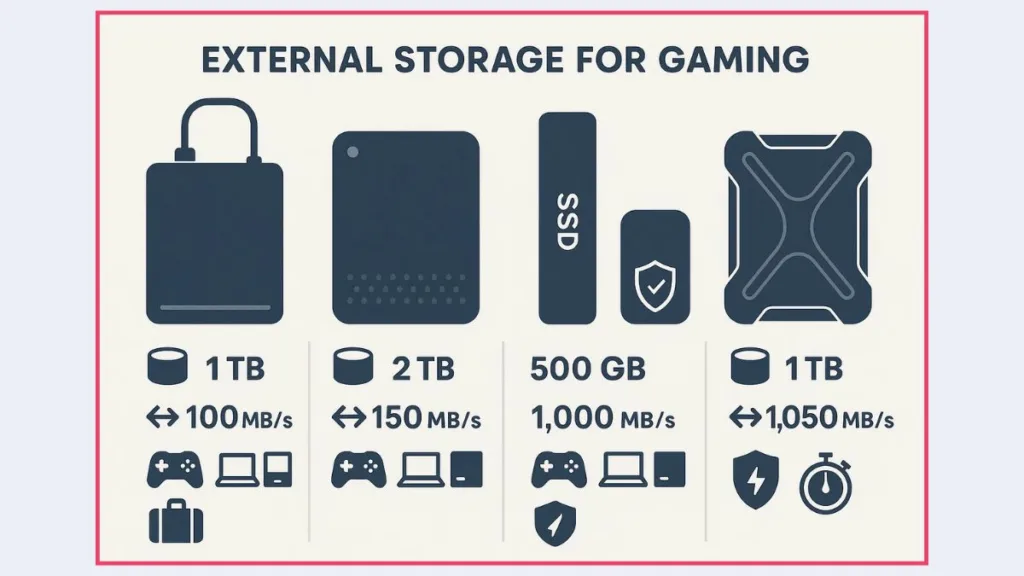
In 2025, some drives stand out due to their speed, durability, capacity, and value. Below, we break down the top-rated choices for different gaming needs.
Samsung T7 Shield: Best Durable SSD for Gaming
The Samsung T7 Shield is perfect for gamers who prioritize durability and consistent performance.
Capacity & Performance: Available in 1TB, 2TB, and 4TB, it offers read speeds up to 1050 MB/s and write speeds up to 1000 MB/s. Its 3D NAND flash ensures reliable data retention and smooth file transfers.
Durability: The T7 Shield is drop-proof, dust-resistant, and IP65-rated, making it ideal for clumsy or mobile gamers. Its rubberized casing protects against scrapes, bumps, and minor spills.
Why Gamers Love It: This drive maintains consistent transfer speeds even during large file transfers, which is essential for modern AAA titles. While it doesn’t match the peak speeds of USB 3.2 Gen 2×2 drives, its reliability and rugged design make it a top choice for portable gaming.
Considerations: If you want peak performance for short bursts, drives like the Samsung T9 might deliver slightly faster initial speeds, but the T7 Shield offers long-term consistency.
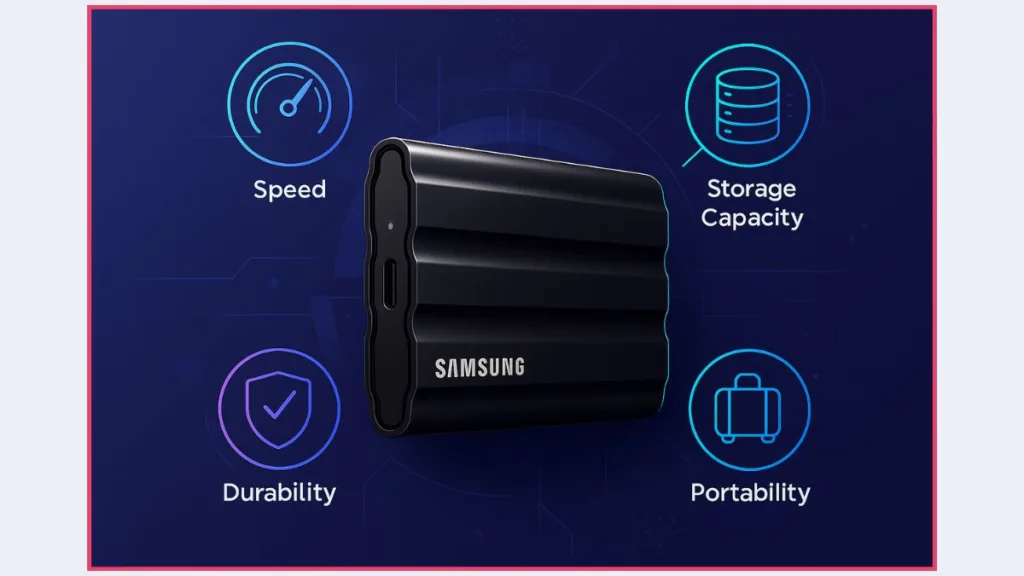
SanDisk Desk Drive: Best for Backups and Massive Libraries
For gamers with large game libraries or media collections, the SanDisk Desk Drive 8TB is hard to beat.
Capacity & Performance: It comes in 4TB and 8TB models with read/write speeds of 1000/900 MB/s, providing consistent performance for backups and large transfers.
Power & Portability: Unlike portable SSDs, the Desk Drive requires external power, making it less convenient for on-the-go gaming but perfect as a desktop storage solution.
Why Gamers Love It: Its stable transfer speeds and compatibility with backup software make it ideal for storing full system backups, huge game libraries, or large media files. Gamers who want fast load times for massive collections will find this drive particularly appealing.
Considerations: If you’re looking for portability, this might not be your best option. It’s designed to stay put on a desk, rather than accompany you to LAN parties.
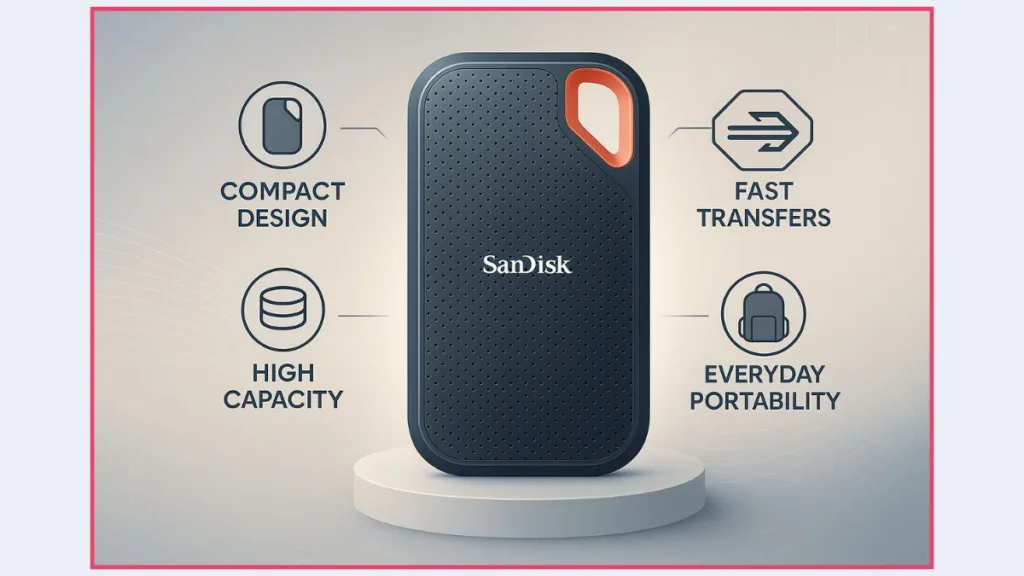
WD Black P50 Game Drive: Fastest SSD for Competitive Gaming
The WD Black P50 Game Drive is built for gamers who demand speed.
Capacity & Performance: Available in 500GB, 1TB, and 2TB, this SSD offers read and write speeds of 2000 MB/s, one of the fastest external SSDs for gaming in 2025.
Design & Durability: Compact and sleek, it fits easily in your backpack or gaming setup, and its aluminum casing provides scratch and heat resistance.
Why Gamers Love It: High read/write speeds mean minimal load times and smooth in-game performance, especially for competitive titles or large open-world games.
Considerations: Price is higher than budget SSDs, but the performance boost for PC gaming, Steam Deck, or high-end laptops is worth it for serious gamers.
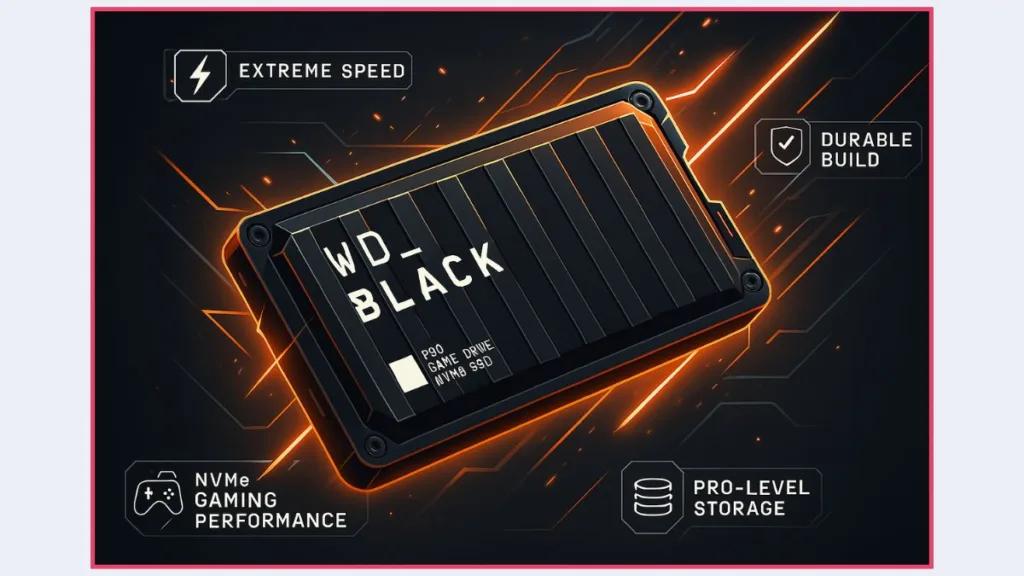
Adata SE920 / SD810: Best Budget-Friendly SSDs
If you’re searching for the best budget external SSD for gaming, Adata’s SD810 and SE920 offer great performance without breaking the bank.
Capacity & Performance: They are available in 1TB, 2TB, and 4TB, with read speeds ranging from 1000 MB/s to 2000 MB/s, depending on the model.
Durability & Design: Both feature ruggedized casings, providing shock resistance and portability, ideal for students or casual gamers on the go.
Why Gamers Love It: These drives deliver excellent speed-to-price ratio, making them perfect for gamers who need fast transfers and reliability without spending a premium.
Considerations: While not as premium-feeling as Samsung or WD drives, they provide dependable performance for most gaming setups.
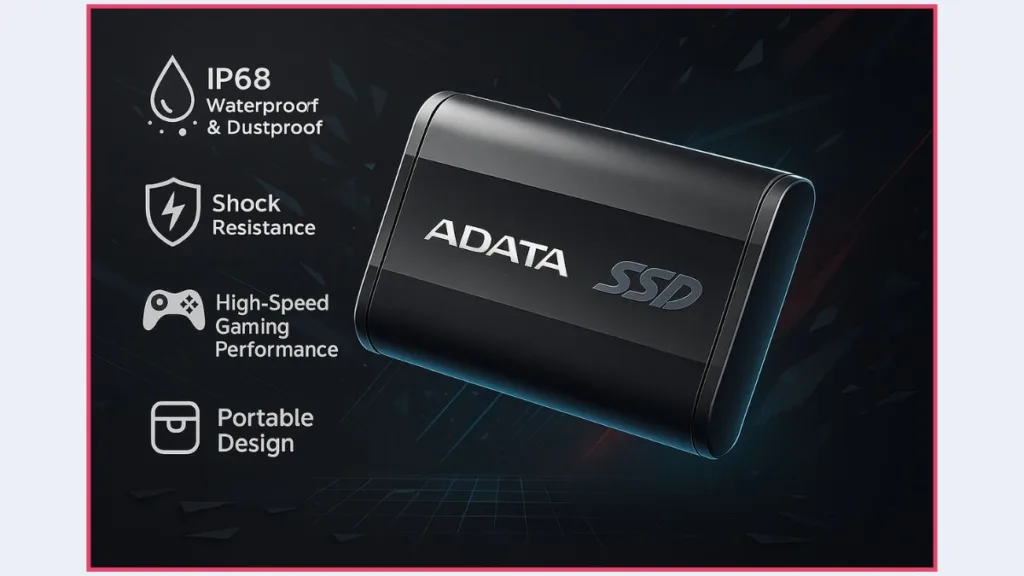
Key Takeaways for Gamers in 2025
When selecting the best external SSD for gaming, consider your use case:
- Portable & rugged: Samsung T7 Shield or Adata SD810.
- Massive storage & backups: SanDisk Desk Drive 8TB.
- Speed & competitive gaming: WD Black P50.
- Budget-conscious with good performance: Adata SE920 / SD810.
All these drives offer solid read/write speeds, USB-C compatibility, and gaming-focused performance, making them standout options for PC, consoles, or Steam Deck setu
Best External SSDs for Consoles and Portable Devices
Gaming today isn’t just about PCs—consoles, handheld devices, and portable setups are becoming equally important. Choosing the right external SSD for your console or portable device can significantly improve load times, storage management, and overall gameplay experience.
External SSDs for PlayStation 5
The PS5 supports high-speed external SSDs for game storage and media files (though PS5 games still run best from the internal NVMe drive).
For PS5 gamers, the Samsung T7 Shield and WD Black P50 Game Drive are excellent options. Both offer USB-C compatibility, durable build, and high read/write speeds, allowing you to store multiple AAA titles without worrying about lag or slow load times.
While Sony’s internal drive requirements are strict for NVMe SSDs used for running games directly, these external drives work flawlessly for offloading older titles, backups, and media libraries, freeing up precious internal storage.
External SSDs for PlayStation 4
The PS4 can leverage external SSDs to dramatically improve load times for both games and applications.
Adata SD810 and SanDisk Extreme Portable SSDs are particularly suitable for PS4 users. They offer budget-friendly pricing, shock-resistant casing, and read/write speeds that far outpace traditional external HDDs. This results in quicker boot times, faster game launches, and smoother gameplay.
For PS4 owners, an external SSD is a simple upgrade that doesn’t require opening the console, making it accessible to all types of gamers.
External SSDs for Xbox Series X and Series S
Xbox Series X and S gamers are increasingly turning to external SSDs to expand storage without sacrificing speed.
WD Black P50 and Samsung T7 Shield are standout choices here. With USB 3.2 Gen 2×2 support, these drives ensure fast load times for digital games and large media libraries. They’re also portable, letting gamers move their libraries between home consoles, LAN parties, or gaming lounges with ease.
External SSDs for Steam Deck and Handheld Devices
The Steam Deck and other handheld gaming devices benefit enormously from portable SSDs due to limited onboard storage.
The Samsung T7 Shield shines here because of its rugged design, shock resistance, and IP65 dust- and water-resistance rating, making it ideal for gaming on the move. Adata SE920 is another solid option for budget-conscious handheld gamers, providing decent speed and portability without taking up too much space in a backpack.
Key Features Gamers Should Look for in Console SSDs
- Speed: Look for high read/write speeds (ideally 1000 MB/s+) to reduce loading times and in-game lag.
- Durability: Rugged casing and shock resistance ensure your SSD survives drops and knocks, especially for portable setups.
- Portability: Compact, lightweight drives are perfect for LAN parties, friends’ houses, or travel.
- Capacity: Depending on your gaming library, consider 2TB or higher to store AAA titles, media files, and backups.
- USB Compatibility: USB-C or USB 3.2 Gen 2×2 ports provide the best speeds and future-proofing.
For console and portable device gamers in 2025, an external SSD isn’t just storage—it’s a performance upgrade. Drives like the Samsung T7 Shield, WD Black P50, and Adata SE920 give you speed, durability, and portability, letting you maximize gaming experience on PS5, PS4, Xbox, or Steam Deck without compromise.
Step-by-Step Guide: Installing Games on an External SSD
Installing games on an external SSD is one of the smartest moves a gamer can make in 2025. Not only does it help free up your internal storage, but it also dramatically improves game load times, reduces stuttering, and gives you the flexibility to carry your game library anywhere. With modern game sizes averaging 100GB to 200GB per title, having a reliable external SSD is no longer a luxury—it’s a necessity.
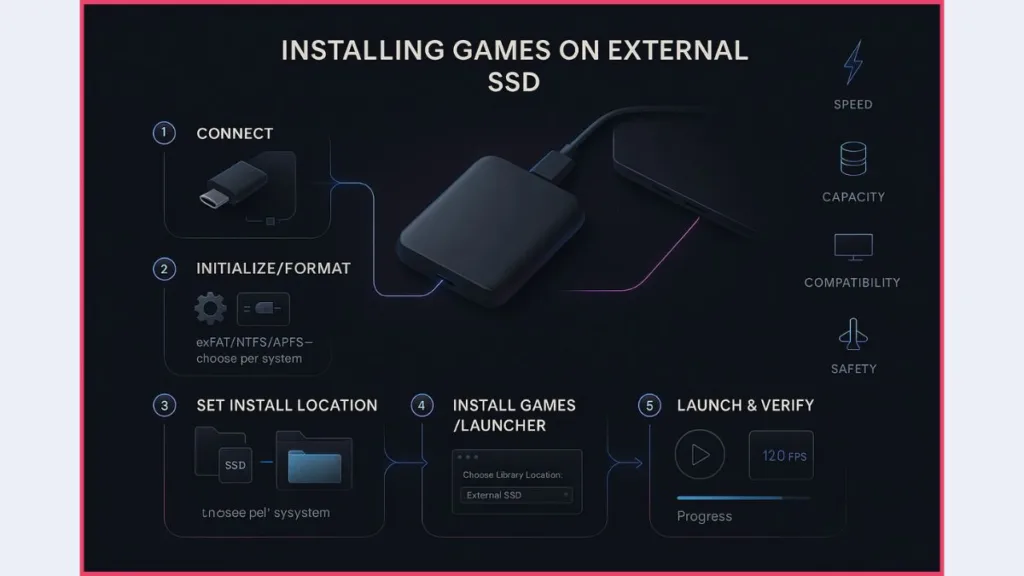
Step 1: Connect Your External SSD
The first step is to properly connect your external SSD to your PC, gaming laptop, console, or portable gaming device. Always use the cable included with the SSD or a high-quality USB-C/USB 3.2/Thunderbolt 4 cable. Using a lower-rated cable can limit your read/write speeds, meaning your games won’t load as quickly as they could.
For context, Samsung’s T7 Shield offers sequential read/write speeds of up to 1,050/1,000 MB/s, making it excellent for gamers on the go. Meanwhile, the Adata SD810 pushes up to 2,000 MB/s, and if you have a USB4 or Thunderbolt 4 port, some SSDs like the WD Black P50 Game Drive can reach speeds up to 2,000–2,200 MB/s. Ensuring your SSD is connected via a compatible port maximizes these benefits.
Once plugged in, your device should detect the drive automatically. If it doesn’t, check your system’s disk management or storage settings, as some older consoles or laptops may require manual recognition.
Step 2: Format the Drive for Optimal Compatibility
Most external SSDs are pre-formatted, but reformatting may be necessary to ensure full compatibility with your system. The formatting process also ensures that file transfer speeds and performance are optimized for gaming.
- For Windows PCs: Open Disk Management, right-click on the external SSD, and select Format. Choose NTFS for PC gaming or exFAT if you plan to use the SSD across multiple platforms. ExFAT is especially handy if you intend to move the SSD between a PC and consoles.
- For PlayStation 5: Navigate to Settings > Storage > Extended Storage, and follow the prompts to format your SSD for games. PS5 will ensure the drive is optimized for fast load times.
- For Xbox Series X/S: Go to Settings > System > Storage, select your SSD, and format it for games and apps. Xbox automatically optimizes the SSD for performance and game installation.
Important: Formatting will erase all existing data on the drive, so make sure to back up any files before starting.
Step 3: Install or Move Games to Your External SSD
Once the drive is connected and formatted, you can install new games directly or move existing titles to the external SSD.
- On PC (Steam, Epic, or Battle.net): During installation, select the external SSD as the destination drive. Steam allows multiple library folders, so you can maintain separate game libraries on your SSD and internal storage.
- On PlayStation: Go to Settings > Storage, select the game or apps you want to move, and choose Move to Extended Storage. This is especially useful for large PS5 games like Hogwarts Legacy or Final Fantasy XVI, which can exceed 150GB.
- On Xbox: Navigate to My Games & Apps, select the title, and choose Move to External Storage. Xbox Game Pass titles benefit significantly from the faster load times offered by premium SSDs like the WD Black P50 or SanDisk Extreme Pro Portable SSD.
This step ensures that your internal storage isn’t overloaded and that you can carry a large game library without constantly uninstalling titles.
Step 4: Optimize SSD Performance for Gaming
Even after installation, there are several ways to maximize your external SSD’s performance:
- Use a high-quality cable rated for your drive’s USB standard. A poor-quality cable can create bottlenecks.
- Enable write caching on Windows: Open Device Manager > Disk Drives > Properties > Policies and select Better Performance. This can improve file transfer speeds and game load times.
- Avoid using USB hubs or splitters that don’t support full bandwidth, as this can slow your SSD.
- Keep the SSD in a well-ventilated area, especially during extended gaming sessions, to prevent overheating. Some SSDs, like the SanDisk Extreme Pro Portable SSD, are designed with heat-resistant housings, but proper airflow still matters.
- Regularly update the SSD firmware via the manufacturer’s software to maintain compatibility, stability, and performance enhancements.
Step 5: Safely Eject Your SSD
To avoid data corruption and prolong the lifespan of your SSD, always safely eject it before disconnecting:
- Windows: Right-click the drive in File Explorer and select Eject.
- PlayStation: Go to Settings > Storage, select your external SSD, and choose Eject.
- Xbox: Navigate to Settings > System > Storage, select your SSD, and select Eject.
By doing this, you prevent interrupted file transfers or corruption during gameplay.
Pro Tips for 2025 Gamers
- Consider an SSD with at least 1–2TB for modern AAA games, as file sizes continue to grow rapidly.
- If you are a console gamer, check for PS5 or Xbox Series X compatibility, as some games require NVMe-level speeds to run optimally.
- For portable gaming on devices like the Steam Deck, an external SSD with USB 3.2 Gen 2×2 or Thunderbolt support ensures fast load times without taxing your device.
Installing games on an external SSD is no longer just an optional upgrade—it’s a must-have solution for any gamer who wants faster load times, more storage flexibility, and the freedom to play anywhere. With the right setup, your external SSD can function almost like a second internal drive, delivering high-speed performance and seamless gaming experiences.
External SSD FAQ: Everything Gamers Ask
Gamers often have a lot of questions about external SSDs for gaming. Let’s break down the essentials.
What Exactly Is an External SSD for Gaming?
An external SSD is a portable solid-state drive for storing games outside your PC or console. Unlike HDDs, it delivers faster read/write speeds, which means reduced load times and smoother gameplay. Perfect for large libraries or swapping devices.
Can You Run Games Directly from an External SSD?
Yes! PCs, Steam Deck, Xbox Series X/S, and PS4 games can be stored and launched from external SSDs. PS5 games must be transferred internally to play, but storage flexibility is unmatched.
How Big Should My External SSD Be?
For moderate gamers, 2TB handles 50–100 AAA titles. 4TB or more suits huge libraries. Smaller drives (500GB–1TB) work for a few favorites, but modern games often exceed 100GB, so bigger is better.
Which External SSD Is the Fastest?
Top-speed drives use USB 3.2 Gen 2×2 or Thunderbolt 4/USB4, reaching 2,000–7,000 MB/s. Samsung T9 and WD Black P50 are examples of high-speed, game-ready drives.
NVMe vs SATA: Which One Should I Pick?
NVMe SSDs outperform SATA, offering faster sequential and random speeds. SATA drives are cheaper but slower (~540 MB/s). For AAA games and large libraries, NVMe is the way to go.
How Do I Keep My External SSD in Top Shape?
Always eject safely, avoid heat, update firmware, and use compatible cables/ports. These simple steps preserve speed and lifespan.
Where to Score the Best Deals on External SSDs for Gaming
Finding the best external SSD for gaming isn’t just about specs—it’s also about getting great value. With the right approach, you can grab high-performance drives without breaking the bank.
Trusted Online Retailers
Amazon remains a go-to for gamers hunting for deals on external SSDs. From the Samsung T7 Shield to the SanDisk Extreme Portable, you can often find discounts, bundle offers, and free shipping. Keep an eye on seasonal sales like Prime Day or Black Friday for maximum savings.
Newegg is perfect for tech enthusiasts looking for high-speed NVMe drives. They frequently list promo codes and flash sales, making it easy to snag a 2TB or 4TB gaming SSD at a lower price.
Other online options include B&H Photo, Best Buy, and Walmart, where you can compare prices across brands like WD, Seagate, Samsung, and Adata. These retailers often match competitor pricing, helping you get the best deal without compromise.
Regional Options
For UK gamers, stores like Scan, Ebuyer, and Argos often have competitive offers on external SSDs. Amazon UK also features deals similar to its US counterpart, with quick shipping and customer reviews that help gauge quality.
Timing Your Purchase
Timing can make a huge difference. New product releases can push previous-generation drives down in price, meaning you can score premium SSDs at budget-friendly rates. Additionally, watch for back-to-school, holiday, or gaming event sales, which often include bundle deals with extra storage or accessories.
Consider Refurbished or Open-Box Deals
Some retailers, like Newegg or Best Buy, offer certified refurbished or open-box external SSDs. These drives are tested for performance and durability, often coming with manufacturer warranties, giving you high value without paying full price.
Final Verdict: Which External SSD Should Gamers Choose?
Choosing the best external SSD for gaming ultimately comes down to your specific needs, budget, and gaming setup. Let’s break it down in a way that makes the decision clear and actionable.
Performance vs. Portability
If you prioritize blazing-fast load times and consistent performance, drives like the Samsung T7 Shield or Adata SD810 are excellent choices. They combine high read/write speeds, durability, and shock resistance, making them perfect for PC gamers or those constantly on the move with a gaming laptop.
On the other hand, if capacity is your main concern—such as storing entire game libraries or media collections—the SanDisk Desk Drive 8TB shines. While less portable, its external power supply and consistent transfer speeds make it ideal for backup-heavy setups or console-based gaming.
Console-Specific Recommendations
For console gamers, it’s important to match the SSD with your platform. PS5 owners will want a fast NVMe drive to minimize loading times, while Xbox Series X/S users can leverage USB-C external SSDs to expand storage with minimal hassle. Portable SSDs like the Samsung T7 Shield or WD Black P50 are great choices here because they combine durability, speed, and convenience.
Budget Considerations
Not every gamer needs top-of-the-line specs. For those seeking affordable yet reliable options, there are budget-friendly external SSDs that still provide significant speed improvements over HDDs. Drives in the 1TB to 2TB range offer a great balance of price, performance, and portability, perfect for gamers just starting to expand their storage.
Key Takeaways
- For speed and portability: Samsung T7 Shield, Adata SD810.
- For massive storage and backups: SanDisk Desk Drive 8TB.
- For console-focused gaming: WD Black P50, Samsung T7 Shield.
- For budget-conscious gamers: 1–2TB options from trusted brands like Samsung, Adata, or SanDisk.
The Izoate Insight
Ultimately, the best external SSD for gaming is one that matches your gaming habits, device, and performance expectations. There’s no one-size-fits-all answer, but by focusing on speed, capacity, durability, and portability, you can confidently choose a drive that will elevate your gaming experience.
Whether you’re reducing load times, transporting games between PCs and consoles, or backing up massive game libraries, investing in the right external SSD is a decision that will pay off in smoother gameplay and stress-free storage management.
Visit Our Post Page: Blog Page
